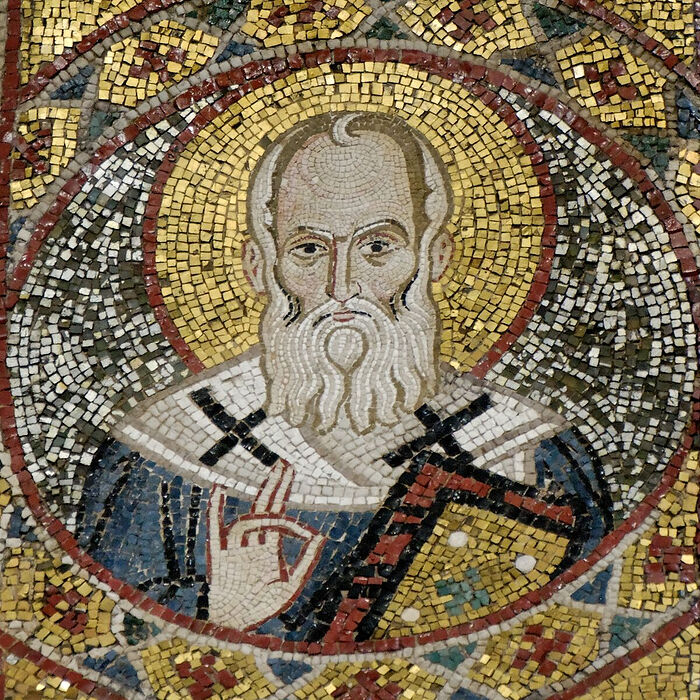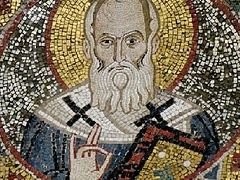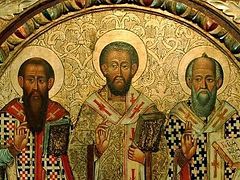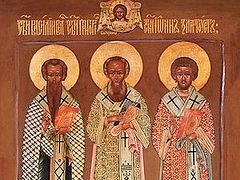It is pleasant for me to speak to you even a little about the hymns which we sing, so that you might take delight not only in the sounds, but that your mind itself might be in due measure inflamed by the power of the words. Thus, what have we sung just now? “This is the day of Resurrection! Let us offer ourselves as a sacrifice.”
In antiquity the sons of Israel, on the feast-days or triumphs, offered to God gifts according to the Law, that is sacrifices, whole-burnt offerings, first-fruits and the like. Therefore St. Gregory teaches us also (like them) to make celebration unto the Lord, as they did, and inspires us, saying, “The day of Resurrection,” in place of the “The day of the holy feast, the day of the Divine solemnity, the day of the Pascha of Christ.” And what does the Pascha of Christ mean? The sons of Israel performed the Pascha, Passover when they departed from Egypt; and now Pascha, the celebration of which St. Gregory is encouraging us to keep, is performed by the soul which departs from the mental Egypt, that is, sin. For when the soul passes over from sin to virtue, that is when it celebrates the Pascha of the Lord as Evagrius has said; the Pascha of the Lord is the passing over from evil to good.
And thus now today is the Pascha of the Lord, the Day of the Bright Festival, the Day of the Resurrection of Christ Who has crucified sin, Who has died for us and arisen. Let us also offer to the Lord gifts, sacrifices, whole-burnt offerings--not of irrational animals, which Christ does not wish, for sacrifice and offering hast thou not desired. Whole burnt offerings and oblations for sin hast Thou not demanded (Ps. 39:9, 10). And Isaiah says, of what value to me is the abundance of your sacrifices? saith the Lord (Is. 1:11), and the rest. But since the Lamb of God was killed for us, according to the words of the Apostle who said: For even Christ our Passover is sacrificed for us (I Cor. 5:7), Christ has redeemed us from the curse of the Law, being made a curse for us: for it is written, cursed is every one that hangeth on a tree (Gal. 3:13, Deut. 21:23), To redeem them that were under the law, that we might receive the adoption of sons (Gal. 4:5); and so we also should offer Him a certain God-pleasing gift.
And what kind of gift or what kind of sacrifice is it that we should offer to Christ on the day of the Resurrection, that might be pleasing to Him inasmuch as He does not desires sacrifices of irrational animals? The same Saint instructs us again in this, for having said, “The day of Resurrection” he adds, “Let us offer ourselves.” Thus also the Apostle says, present your bodies as a living sacrifice, holy, acceptable unto God, which is your reasonable service (Rom. 12:1). And how should we offer our bodies to God as a living and holy sacrifice? By no longer fulfilling the will of our flesh and our thoughts (Eph. 2:3), but acting in the Spirit, and without fulfilling the lust of the flesh (Gal. 5:16); for this is what it means to Mortify your members which are upon the earth (Col. 3:5). This is why it is called a living sacrifice, holy and pleasing to God.
And why is it called a living sacrifice? Because the irrational animal who is offered in sacrifice, when he is killed, dies. But the Saints who offer themselves as a sacrifice to God are daily killed while being alive, as the Prophet David says, For Thy sake we are slain all the day long, we are counted as sheep for the slaughter (Ps. 43:22). This is what is meant by the word of St. Gregory: “Let us offer ourselves,” that is let us offer ourselves as a sacrifice; let us daily mortify ourselves, as also all the Saints have mortified themselves for the sake of Christ our God Who died for us.
And how did they mortify themselves? Love not the world, neither the things that are in the world (I John 2:15), as is said in the Catholic Epistle, but having renounced the lust of the flesh, the lust of the eyes and the pride of life (I John 5:16)--that is the love of pleasure, the love of money, and vainglory--they took up the Cross and followed after Christ and crucified the world to themselves and themselves to the world (cf. Gal. 6:14). Concerning this the Apostle says, And they that are Christ’s have crucified the flesh with the affections and lusts (Gal. 5:24). Behold how the saints have mortified themselves. And how did they offer themselves as sacrifice? By not living for themselves, by subjecting themselves to the commandments of God, and abandoning their own desires for the sake of the commandment to love God and their neighbor, as St. Peter has said, Behold, we have forsaken all and followed Thee (Mt. 19:27) What did he forsake? Did he have money or possessions, gold or silver? He had a net, and that was old, as St. John Chrysostom has said. But he abandoned, as was mentioned, everything, that is: all his desires, all his attraction to this world, so that if he had any possessions or wealth, he clearly despised them all, and taking up the Cross he followed after Christ according to what has been said, Nevertheless I live; yet not I, but Christ liveth in me (Gal. 2:20). Behold how the Saints offered themselves as a sacrifice! They mortified in themselves, as we have said, every attachment and their own will and lived for Christ alone and His commandments. Thus let us also offer ourselves in sacrifice as St. Gregory teaches; for God desires us, for we are “His most precious children.” In truth a man is more precious than all visible creatures, for the Creator brought them into existence by His Word, saying: “Let there be, and there was,” and again, “Let the earth bring forth such-and-such, and it was so; let the water bring forth,” and so on (cf. Gen 1:3, 11, 20). But God created man with His own hands, adorned him, and made everything else in order to serve him and give him repose. God set man as king over all this creation and allowed him to enjoy the sweetness of Paradise. And what is even more astonishing, when man was deprived of all this through his sin, God again called him by the Blood of His Only-Begotten Son. Man is the most precious acquisition, as the Saint has said, not only the most precious but the one closest to God of all creation, for He said, Let Us make man according to Our image and likeness. And again, God made man according to the image of God. He made him and breathed upon his face the breath of life (Gen. 1:26, 27; 2:7). And our Lord Himself, having come to us, accepted the form of man, a human body and soul; in a word, He became man in everything except sin, and, so to speak, by this made man like to Himself, made him His own. And thus the Saint has well and fittingly said that “man is the most precious acquisition.’ Then, speaking even more clearly, he adds, “Let us render unto the Image that which was created in His Image.” But what does this mean? Let us learn this from the Apostle who said, Let us cleanse ourselves from all filthiness of the flesh and spirit (II Cor. 7:1) Let us make our image pure just as we received it, let us wash it from the filth of sin so that its beauty, which comes from the virtues, might be uncovered. It was about this beauty that David prayed when he said, O Lord, by Thy will hast Thou granted power to my beauty (Ps. 29:7). And thus let us purify in ourselves the image of God, for God demands this of us, since He gave us an image having neither spot, nor wrinkle nor any such thing (Eph. 5:27). Let us render unto the Image that which was made according to the image, let us acknowledge our dignity; let us realize what great good thing we have become worthy of; let us remember in Whose image we were created, let us not forget the great good things given to us by God solely out of His goodness and not according to our worth; let us understand that we are created according to the image of God Who created us.
“Let us venerate the Archetype.” Let us not offend the Image of God, according to which we were created. What (artist) who, desiring to paint a depiction of the emperor, would dare to use some kind of cheap paint for it? Will he not by this dishonor the emperor and be subject to punishment? On the contrary he will use for this good and shining paints worthy of the depiction of the emperor; he might even apply gold itself to the depiction of the emperor and will strive to present all the garments of the emperor, if possible, in such a way that one seeing a depiction that takes in all the distinctive characteristics of the emperor would think that he is beholding the emperor himself, the original, for the depiction is magnificent and elegant. So also we, being created in the image of God, should not dishonor our Archetype, but should make our image pure and glorious, worthy of the Archetype. For if an artist is punished for dishonoring the image of the emperor, who is visible and has passions like us, then what shall we undergo if we disdain the Divine Image in ourselves, and return, as the Saint has said, “the image unclean?”
“Thus let us honor the Archetype, let us understand the power of the mystery and for whom Christ has died.” The power of the mystery of the death of Christ is this: inasmuch as we through sin have lost in ourselves the image of God and therefore through the fall and sin have become mortal, as the Apostle has said (Eph. 2:1), therefore God Who created us in His Image, having had mercy on us, on His own creation and His own image, for our sake became man, and suffered death for all so as to raise us who have been killed into the life which we lost on account of our disobedience. For He ascended on the Holy Cross and crucified sin--the sin for which we were banished from Paradise--and led captivity captive as it says in the Scripture (Ps. 67:18; Eph. 4:8). What does this mean: “led captivity captive?” This means that after the transgression of Adam the enemy took us captive and held us in his power so that human souls which departed from the body went to hell, for Paradise was closed. But when Christ ascended on the heights of the Holy and Life-giving Cross, then by His own Blood He delivered us from the captivity by which the enemy had taken us for our transgression; that is, He snatched us from the hands of the enemy, and so to speak, recaptured us, conquering and overthrowing the one who had taken us captive. Wherefore it says in the Scripture that He “led captivity captive.” Such is the power of the mystery; Christ died for us so that, as the Saint said, He might raise us up into life who have been killed.
And thus we have been delivered from hell by Christ’s love of mankind, and it is up to us whether we go to Paradise, for the enemy no longer compels us as he did before and does not keep us in slavery. Only let us take care for ourselves O brethren, and preserve ourselves from sin in very deed. For many times before I have said to you that every sin which is fulfilled in deed again enslaves us to the enemy, inasmuch as we voluntarily throw ourselves down and enslave ourselves to him. Is this not a shame and is this not a great misfortune if, after Christ has delivered us from hell by His own Blood and after we have heard all this, we should again go and throw ourselves into hell? Are we not in this case deserving of yet greater and more powerful torture? May the Lover of mankind, God, have mercy on us and grant us heedfulness, so that we might understand all this and profit by it, that we might obtain at least a small portion of God’s mercy.




